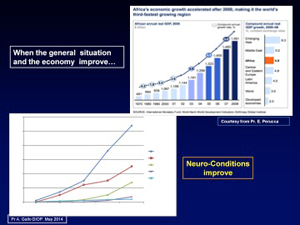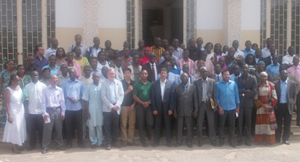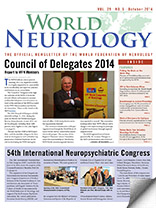Development, Opportunity, Hope and Challenges
By Amadou Gallo Diop and Riadh Gouider

Figure 1. Evolutions, by the time, of economy data and number of neurologists and facilities in Sub-Saharan Africa (South Africa and Maghreb not included).
At the end of 2014, 15 new young neurologists will contribute to increase the number of rare specialists in Sub-Sahara-African countries. These new cohorts have been trained in Dakar, Abidjan and Addis-Ababa. They originate from Benin, Burkina Faso, Cameroon, Comoros, Ivory Coast, Ethiopia, Mali, Mauritania, Niger, Rwanda, Senegal and Togo. Their professors are from African universities with the support (by short visiting professorship collaboration) of French and North American colleagues. The four-year content of their training program was very broad, similar to any courses worldwide and composed of all aspects of neurology, including neuro-anatomy, neurophysiology, basic neuroscience, semiology, pathologies and strategies of care. Courses focus on the most prevalent neuro-conditions in the African continent and how to adapt ideal management to the local socio-economic realities. Practical training was obtained with clinical outpatient and inpatient tasks, under the auspices of assistant and senior professors. In neurological departments, but also in other services such as cardiology, psychiatry, internal medicine, pediatrics and some ground visits and duties in provinces or suburban areas. That type of course is applied to selected MDs who intend to specialize in neurology since two decades in Africa. Before the 1990’s, African neurologists were, in majority trained abroad in ex-colonizing countries i.e. France, UK, Belgium, Portugal, Germany, Russia or Switzerland.
The good news is that in 50 years, from 1974 – 2014, the number of neurologists has multiplied by more than 30 while the population has multiplied by three in Sub-Saharan Africa. It’s crucial and very interesting to see that the same situation is noted regarding the economy. One can see that the Growth Development Product has followed the same dramatic evolution, rising from $461 billion in the 70’s to up to $1,500 in 2008. The continent faces the third fastest GDP growth after the “Dragons” and Petrol-Middle-East Region as shown in Figure 1 (courtesy furnished by Pr Perucca, Pdt of the ILAE). The same remark can be done about diagnostic facilities (EEG, EMG, and neuro-imaging facilities). That let us see that when the general economic situation improves, the “neuro-conditions” improve in term of human and material resources. This is encouraging and is a reason for being more optimistic.

A training course in neurology and epileptology in Dakar, with trainees and faculty coming from different continents.
But there is still so much to achieve. While WHO recommendations is to reach at least the ratio of one neurologist for 50,000 people in a state, the fact in Sub-Saharan Africa is, in the “best” case, one for 500,000 (Ivory Coast and Senegal). In Ethiopia, the ratio was one for 10 million people 10 years ago; it is now one for 5 million. All the French-speaking countries have now at least one neurologist. Few countries have just one neurologist. Nowadays, only very rare sub-African countries do not have even one single neurologist (Cape Verde Islands, Gambia, Equatorial Guinea, Guinea-Bissau, Liberia, Sao Tome and Principe). One can remark that the majority of them are Portuguese-speaking states. Many countries have tenfold more native neurologists in North America, Europe or the Gulf countries than locally. In 15 years, few immigrant neurologists still residing abroad are initiating annual or bi-annual short-term periodic come-back-home for teaching and supporting somehow research, equipment and care.
It’s also very encouraging to see that the number of training courses has dramatically increased these last years. If we consider all training courses dedicated to the nervous system and co-organized by Pan-African Association of Neurological Sciences (which will soon become African Academy of Neurology), Society for Neurosciences in Africa, and almost a dozen of international bodies (WFN, IBRO, EFNS (now EAN), ILAE and IBE, AAN, SFN, WSO, PAUNS, HIS, ICNA, MDS) their number and quality is increasing. They occur every year in English or French.
But the challenges are still huge. The Sub-Saharan Region of Africa still needs many more neurologists for filling the gap. Every professor who has ever lectured in Africa is amazed by how motivated and thirsty for learning the trainees are. Many volunteers come and spend a few days with young MDs specializing in neurology and neurosciences for theoretical lessons and clinical activities. The ultimate goal is to increase, by massive training, the number of neurologists in Sub-Saharan Africa. Let us share this formula from Sam Kinyangui (cited by Charles Newton, Kenya) and which could be our common vision about Neuro-Training in Sub-Saharan Africa: “Attract, Train, and Retain.” At this moment, several universities have set up curricula for training in neurology: Dakar since 50 years, Abidjan since 20 years and more recently: Addis Ababa, Cotonou, Kinshasa, Lome, Yaounde and some Nigeria’s cities which university teaching hospitals are training grounds. They do not partake in the final diploma because the two awarding bodies are The West African Post Graduate Medical College, and the National post Graduate Medical college, if we refer to Pr Ogun, Nigeria. Four to six new trained neurologists from new training sites (Lome, Cotonou, Yaoundé) will graduate from 2015 and 2016. Individually, or under the auspices of bilateral academic cooperation or the umbrella of international neuro-institutions, the short visiting professorships, in cooperation with local faculty, should be encouraged by any mean (finances, teaching materials and slides, neuro examination means and books).
Gallo Diop is with the World Federation of Neurology Africa Initiative. Gouider is the World Federation of Neurology Africa Region Chair.
